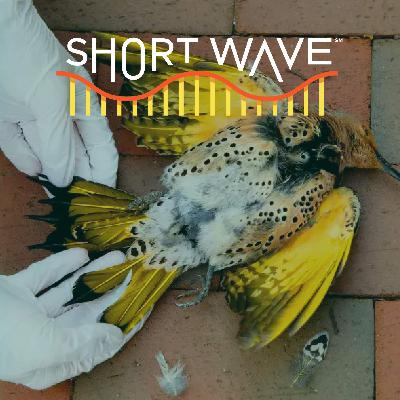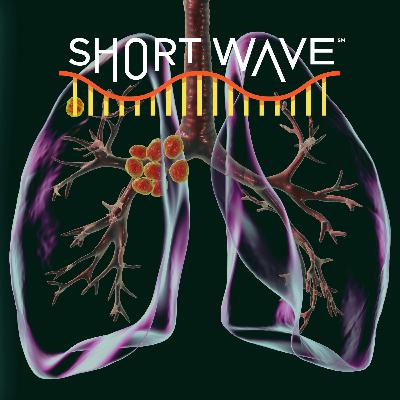Discover Short Wave
Short Wave

Short Wave
Author: NPR
Subscribed: 25,297Played: 2,985,061Subscribe
Share
© Copyright 2019-2025 NPR - For Personal Use Only
Description
New discoveries, everyday mysteries, and the science behind the headlines — in just under 15 minutes. It's science for everyone, using a lot of creativity and a little humor. Join hosts Emily Kwong and Regina Barber for science on a different wavelength.
If you're hooked, try Short Wave Plus. Your subscription supports the show and unlocks a sponsor-free feed. Learn more at plus.npr.org/shortwave
If you're hooked, try Short Wave Plus. Your subscription supports the show and unlocks a sponsor-free feed. Learn more at plus.npr.org/shortwave
1452 Episodes
Reverse
Cosmic dust can tell scientists about how ice covered Earth during the last ice age. This dust is leftover debris from asteroids and comets colliding in space and this dust constantly rains down on our planet. Researcher Frankie Pavia from the University of Washington recently used a brand new method for estimating climate conditions 30,000 years ago, by looking at the cosmic dust amounts in ancient arctic ocean soil. He and a team found new clues to what melted arctic ice at the end of the ice age. These results may be able to better inform ice melt in the future.Interested in more space science? Email us your question at shortwave@npr.org.Listen to every episode of Short Wave sponsor-free and support our work at NPR by signing up for Short Wave+ at plus.npr.org/shortwave.Learn more about sponsor message choices: podcastchoices.com/adchoicesNPR Privacy Policy
Recently, health influencers on Instagram and TikTok have been vocal about the side effects of hormonal birth control. Check out the most popular videos on the subject, and you’ll hear horror stories about sex drive and skin texture, depression and weight fluctuation. But doctors say that while some side effects are possible, the most extreme stories are often the rarest cases. And one of the most common side effects of not taking birth control … is unplanned pregnancy. Interested in more health science? Email us your question at shortwave@npr.org.Listen to every episode of Short Wave sponsor-free and support our work at NPR by signing up for Short Wave+ at plus.npr.org/shortwave.Learn more about sponsor message choices: podcastchoices.com/adchoicesNPR Privacy Policy
Scientists know why leaves turn yellow in the fall: Chlorophyll breaks down, revealing the yellow pigment that was there all along. But red? Red is a different story altogether. Leaves have to make a new pigment to turn red. Why would a dying leaf do that? Scientists don’t really know. NPR science correspondent Nell Greenfieldboyce reports on the leading hypotheses out there.Read more of Nell's reporting on this topic. Interested in more seasonal science? Email us your ideas at shortwave@npr.org.Listen to every episode of Short Wave sponsor-free and support our work at NPR by signing up for Short Wave+ at plus.npr.org/shortwave.Learn more about sponsor message choices: podcastchoices.com/adchoicesNPR Privacy Policy
Around 250 million years ago, one of Earth’s largest known volcanic events set off The Great Dying: the planet’s worst mass extinction event. The eruptions spewed large amounts of greenhouse gases into the atmosphere, temperatures rose globally and oxygen in the oceans dropped. And while the vast majority of species went extinct, some survived. Scientists like paleophysiology graduate student Kemi Ashing-Giwa want to know why, because lessons about the survivors of The Great Dying could inform today’s scientists on how to curb extinctions today.Interested in more Earth science? Email us your question at shortwave@npr.org.Listen to every episode of Short Wave sponsor-free and support our work at NPR by signing up for Short Wave+ at plus.npr.org/shortwave.Learn more about sponsor message choices: podcastchoices.com/adchoicesNPR Privacy Policy
Why does the New York City skyline look the way it does? In part, because of what happened there 500 million years ago, says geologist Anjana Khatwa, author of the new book Whispers of Rocks. In it, she traces how geology has had profound effects on human life, from magnetism of the ocean floor to voter trends in the Southern U.S.Interested in more geology episodes? Email us your question at shortwave@npr.org.Listen to every episode of Short Wave sponsor-free and support our work at NPR by signing up for Short Wave+ at plus.npr.org/shortwave.Learn more about sponsor message choices: podcastchoices.com/adchoicesNPR Privacy Policy
Ahead of Election Day tomorrow, millions of ballots are being cast in statewide, local and special elections. So, today, we're revisiting an episode asking: What would happen if the rules of our electoral system were changed? Producer Hannah Chinn reported on that very question, and today, with host Emily Kwong, they dive into three voting methods that are representative of alternative voting systems. They look at where these systems have been implemented, how they work and what they may mean for future elections. Want to hear more about how math could change our lives? Email us at shortwave@npr.org and we might cover your idea on a future episode! Listen to every episode of Short Wave sponsor-free and support our work at NPR by signing up for Short Wave+ at plus.npr.org/shortwave.Learn more about sponsor message choices: podcastchoices.com/adchoicesNPR Privacy Policy
Happy Halloween, Short Wavers! In today’s news round-up, we’ve got only treats. Hosts Regina Barber and Emily Kwong fill in NPR’s Ailsa Chang on a debate in spider web architecture, how the details shared in storytelling affect how you form memories and why more pixels may not translate to a better TV viewing experience.Have a science question? Email us your question at shortwave@npr.org.Listen to every episode of Short Wave sponsor-free and support our work at NPR by signing up for Short Wave+ at plus.npr.org/shortwave.Learn more about sponsor message choices: podcastchoices.com/adchoicesNPR Privacy Policy
Like haunted houses? Scientists do! That’s because they’re an excellent place to study how humans respond to – and even actively seek out – fear. In an immersive threat setting, as opposed to a carefully controlled lab, researchers can learn a lot about what scares people, why and how additional factors (like the presence of friends) might affect our experiences.So what have they learned? What determines a good scare versus a bad one? And what’s the evolutionary reason for all of this, anyway? In today’s episode, producer Hannah Chinn heads to the haunted house in search of answers.Have a seasonal science question you want us to investigate on the next Nature Quest? Email us your question at shortwave@npr.org.Listen to every episode of Short Wave sponsor-free and support our work at NPR by signing up for Short Wave+ at plus.npr.org/shortwave.Learn more about sponsor message choices: podcastchoices.com/adchoicesNPR Privacy Policy
In the face of floods, wildfires and other natural disasters, when should a community relocate to avoid potential harm? Listener Molly Magid asks that very question. Molly wanted to know how other communities have chosen the path of “managed retreat.” That’s the purposeful and coordinated movement of people and assets out of harm’s way. In today’s episode, Short Wave's Emily Kwong and Hannah Chinn explore cases from New York to Illinois and Alaska to see how successful relocation happens — and what stops it. Have an environment-based question you want us to investigate on the next Nature Quest? Email us your question at shortwave@npr.org.Listen to every episode of Short Wave sponsor-free and support our work at NPR by signing up for Short Wave+ at plus.npr.org/shortwave.Learn more about sponsor message choices: podcastchoices.com/adchoicesNPR Privacy Policy
People may think of hair loss as a guy thing. But by some estimates, half of all women experience hair loss in their lifetime. And when your social media algorithm gets a whiff? Good. Luck. There are some solutions out there based in science, but not every remedy works for every person — or every type of hair loss. (Yes, there are different types. And the type you have matters!) So today, pharmaceuticals correspondent Sydney Lupkin guest hosts the show to talk about causes of hair loss and how to figure out which treatments may be best for you. Interested in more science behind your health? Email us your question at shortwave@npr.org.Listen to every episode of Short Wave sponsor-free and support our work at NPR by signing up for Short Wave+ at plus.npr.org/shortwave.Learn more about sponsor message choices: podcastchoices.com/adchoicesNPR Privacy Policy
Parasites have roamed the Earth for a long time. They were here before the dinosaurs: The oldest fossils are more than 500 million years old. Today on the show, Regina G. Barber speaks with paleontologists Karma Nanglu and Danielle de Carle about a mysterious fossil called the “Riddler,” and the oldest-ever leech fossil. They share stories of the enduring power of parasitism through the ages and why the clues to prehistoric mysteries may be tucked in a basement.Interested in more science behind rare fossils? Email us your question at shortwave@npr.org.Listen to every episode of Short Wave sponsor-free and support our work at NPR by signing up for Short Wave+ at plus.npr.org/shortwave.Learn more about sponsor message choices: podcastchoices.com/adchoicesNPR Privacy Policy
Around this time of year, every night, a quiet exodus is occurring. Hundreds of millions of birds are migrating thousands of miles south for the winter. One of the biggest dangers for these tiny travelers? Glass. Researchers estimate that every year in the U. S., collisions with glass windows take out at least a billion birds. Even if the birds initially fly away, these collisions can cause concussions, broken bones, and other injuries; most victims don’t survive. After much reporting, NPR science correspondent Nell Greenfieldboyce has found … it doesn’t have to be this way. Scientists and researchers have studied how to stop collisions from happening, and examples around the country indicate that even little solutions can make a big difference.Interested in more seasonal animal science? Email us your question at shortwave@npr.org.Listen to every episode of Short Wave sponsor-free and support our work at NPR by signing up for Short Wave+ at plus.npr.org/shortwave.Learn more about sponsor message choices: podcastchoices.com/adchoicesNPR Privacy Policy
Tuberculosis – the world’s deadliest infectious disease – could be dormant in your system for years before you realize you have it. In the U.S., it’s relatively rare; provisional data shows that there were just over 10,000 cases in 2024. But in other parts of the world, especially lower-income countries, the disease is spreading much more actively. Worldwide, more than 10 million people are diagnosed with an active tuberculosis infection every year. And even though modern medicine has all the tools to cure it, over a million people around the world still die from the sickness annually.Author John Green thinks that’s a problem. In his book Everything is Tuberculosis, he charts the spread of tuberculosis in the past to the lessons it has to teach us in the present.Interested in more science and medical history? Email us your question at shortwave@npr.org.Listen to every episode of Short Wave sponsor-free and support our work at NPR by signing up for Short Wave+ at plus.npr.org/shortwave.Learn more about sponsor message choices: podcastchoices.com/adchoicesNPR Privacy Policy
Some scientists looking to preserve vulnerable species have turned to a controversial technique: synthetic biology. This catchall term often means genetic engineering – introducing new genes to an organism. And a recent narrow vote by the International Union for Conservation of Nature on using the technology shows how divided scientists are on the issue of releasing genetically altered species. Science correspondent Nate Rott wades into the debate with us and reveals whether or not the Union voted to place a moratorium on releasing gene-edited species.Read more of Nate’s reporting on the topic. Interested in more science debates? Email us your question at shortwave@npr.org.Listen to every episode of Short Wave sponsor-free and support our work at NPR by signing up for Short Wave+ at plus.npr.org/shortwave.Learn more about sponsor message choices: podcastchoices.com/adchoicesNPR Privacy Policy
The rate of smoking cigarettes has steadily declined since the 1960s – when Congress required warnings on cigarette boxes. Research shows that people are more likely to try to quit smoking when they’re under 40. But a new study in the journal The Lancet Healthy Longevity shows that quitting later in life can still be beneficial – and could possibly lower your risk for dementia. For this and more news from the science journals, Short Wave hosts Regina G. Barber and Emily Kwong talk with All Things Considered host Mary Louise Kelly.Interested in knowing more about science behind the headlines? Email us your question at shortwave@npr.org.Listen to every episode of Short Wave sponsor-free and support our work at NPR by signing up for Short Wave+ at plus.npr.org/shortwave.Learn more about sponsor message choices: podcastchoices.com/adchoicesNPR Privacy Policy
It's World Anesthesia Day tomorrow! So, we invite you to take a deep breathe. Picture a relaxing scene. Maybe a beach in Tahiti, your toes in the sand, a cold drink in hand. Now imagine your favorite music playing in the background. If Dr. Alopi Patel were your anesthesiologist, that's exactly what she'd have you do while you waited for surgery. Before she puts patients under the sway of anesthesia, she likes to explain everything that will happen after they lose consciousness and lead them in guided imagery to help them relax before their procedure. She calls this "verbal anesthesia," and says "it's a type of anesthesia you can't really put in an I.V." Anesthesia is a cornerstone of modern medicine makes tons of surgeries possible today. But Dr. Patel says it wasn't always this way — and shares the history and mechanisms behind this once-controversial procedure. (encore)Curious about other breakthroughs in the history of science? Let us know by emailing shortwave@npr.org!Listen to every episode of Short Wave sponsor-free and support our work at NPR by signing up for Short Wave+ at plus.npr.org/shortwave.Learn more about sponsor message choices: podcastchoices.com/adchoicesNPR Privacy Policy
Marijuana is decriminalized or legal in some form in multiple states. But, because it’s illegal on the federal level, states have had to build their own regulatory infrastructure. Without a centralized body to guide them, regulations in one state can look vastly different from those in another. For more on the scope of the issue, Short Wave host Regina G. Barber talks to independent science journalist Teresa Carr and NPR pharmaceuticals correspondent Sydney Lupkin. Read more of Teresa’s reporting on state marijuana testing, and more of Sydney’s reporting on the ways California is trying to make weed safer.Interested in hearing more science behind consumer products? Email us your question at shortwave@npr.org – we may feature it on an upcoming episode!Listen to every episode of Short Wave sponsor-free and support our work at NPR by signing up for Short Wave+ at plus.npr.org/shortwave.Learn more about sponsor message choices: podcastchoices.com/adchoicesNPR Privacy Policy
There are more human cells in your body than there are stars in the Milky Way galaxy! Cells are the fundamental building blocks of life but that doesn’t mean they are simple – biology still doesn’t have a full picture of how exactly a living cell works. Host Regina G. Barber talks with bioengineers Kate Adamala and Drew Endy about why scientists are trying to build a cell from scratch, piece by piece. They dive into what it would look like to be inside of a cell, why scientists are bothering with making a cell from scratch and how engineers are leading the field.Want more bioengineering stories? Email us at shortwave@npr.org.Listen to every episode of Short Wave sponsor-free and support our work at NPR by signing up for Short Wave+ at plus.npr.org/shortwave.Learn more about sponsor message choices: podcastchoices.com/adchoicesNPR Privacy Policy
Weather in the tropics is decidedly different than it is in the middle latitudes. It turns out, so are the weather systems – the factors that create things like the daily temperature and humidity! Historically, most weather forecasting models have been based on data from high-income countries in the northern hemisphere. But different factors drive weather and climate near the equator – meaning that these weather forecast models are much less accurate at predicting weather in the tropics. This has implications for storm readiness, flooding preparedness and more. Atmospheric scientist Ángel F. Adames-Corraliza is aiming to change that. His research focuses on how water vapor – humidity – plays a key role in tropical weather systems. It’s earned him a spot as one of this year’s Macarthur Fellows. Interested in more science about how weather happens? Email us your question at shortwave@npr.org.Listen to every episode of Short Wave sponsor-free and support our work at NPR by signing up for Short Wave+ at plus.npr.org/shortwave.Learn more about sponsor message choices: podcastchoices.com/adchoicesNPR Privacy Policy
Some scientific discoveries take place in a lab. Others are made deep in the rainforest, along the ocean floor or on the dark side of the moon. And still others are made squelching through mud and ice on the northernmost island on Earth… at least, if you’re NPR climate correspondent Alejandra Borunda. Two summers ago, Alejandra followed an expedition of scientists to Greenland’s Inuit Qeqertaat, or Kaffeeklubben (“Coffee Club”) Island. The researchers with her were aiming to find what plants grew at the farthest north point of the island. Along the way, she had an adventure … and witnessed the good, the bad and the muddy realities of scientific expeditions.Interested in more exploratory science? Email us your question at shortwave@npr.org.Listen to every episode of Short Wave sponsor-free and support our work at NPR by signing up for Short Wave+ at plus.npr.org/shortwave.Learn more about sponsor message choices: podcastchoices.com/adchoicesNPR Privacy Policy

























It would be nice to see this fixed. Reupload please? 🙏
This is the frog episode again at the moment
Wow-wow-wow! Don't talk over each other!? Editor, can the upload be fixed?
Originally posted on 1/24/2019 {23 days after New Year '19}
Great podcasr.
@10:35 "...for the cannabinoids..." OK, so did the strains with different smells manage to keep similar levels of strength? Because when you have that, consumers can start selecting on the basis of smells and flavours.
The movie "Longitude" is a beautiful frustrating movie, about the competition to create these marine clocks.
Sadly the drugs can only slow it down but the end is still the inevitable fate. Lifetime medication because the disease will just keep emerging again.
Well whats the other levels of infinity?? lol was hoping they would have covered that after dropping the new info (to me) that infinity is not Just infinity)
ALL>FUL>MOVIES>LINK👉https://co.fastmovies.org
OMG, thanks for talking about this! I hate LEDs flicker AND over-brighteness! ESPECIALLY in cars!!! DANGEROUS!!!
It makes sense that they would be afraid of larger more dangerous versions of spiders. I'd be afraid of a giant humanoid too at first.
where can I find the transcript?
They're talking about levees breaking and not one American pie joke, in so disappointed.
i want the links promised!
love most of the shows but this one desperately needed links to the images being discussed.
this was cool
I resent the idea that the piece on learning Chinese as an adult is not a science piece...
this episode seems incredibly similar to the science of spicyness by Rose Eveleth
😭